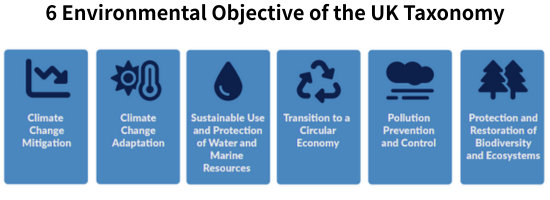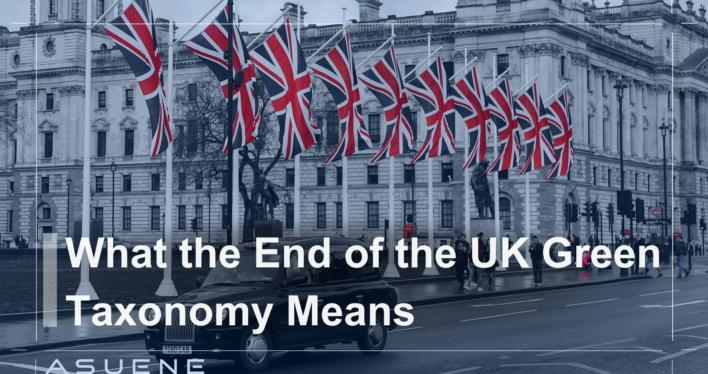- Article Summary
-
Introduction
In July 2025, the UK Government released its long-awaited response to the consultation on the UK Green Taxonomy. The outcome was decisive: the UK will not proceed with legislating a green taxonomy at this time. This decision marks a significant shift in the UK’s approach to sustainable finance and ESG regulation. Originally envisioned as a cornerstone of the UK’s post-Brexit green finance strategy, the taxonomy aimed to define what constitutes an environmentally sustainable activity, thereby enabling investors and businesses to channel capital towards activities aligned with net-zero goals. The abandonment of this framework raises critical questions about the UK’s future role in sustainable finance, regulatory alignment with international markets, and the tools businesses and investors can rely on to navigate the ESG landscape.
The Original Vision for the UK Green Taxonomy
The UK Green Taxonomy was introduced as part of the country’s Green Finance Strategy, aiming to provide a common language for sustainability in economic activity. It was modeled in part on the EU Taxonomy but intended to be more principles-based and tailored to the UK market. The objective was to offer clarity and credibility to green claims, helping combat greenwashing and directing investment toward sustainable outcomes. The taxonomy was supposed to underpin disclosures, investment labels, and regulatory reporting. However, despite initial timelines suggesting implementation by 2023, the project experienced multiple delays. Industry feedback highlighted concerns about complexity, the practical use of the taxonomy, and the absence of reliable data. These delays culminated in the July 2025 decision to indefinitely pause the legislation.

Why the UK Government Is Pulling Back
Read the full consultation response PDF here
The HM Treasury’s July 2025 statement outlined several reasons behind the decision to halt the UK Taxonomy.
Key reasons included:
- Limited evidence that the taxonomy was effectively influencing capital allocation
- Concerns over the taxonomy’s complexity and limited usefulness for investors
- Fears of over-regulation, especially for small and medium-sized enterprises (SMEs)
- Risk of hindering innovation in low-carbon transition strategies
To reduce regulatory burden and stay aligned with international trends, the government has decided to shift its focus toward enhancing disclosure standards rather than implementing a rigid taxonomy.
In place of classification-based regulation, the UK is emphasizing globally recognized reporting frameworks such as the ISSB, TCFD, and TNFD. Central to this approach is the development of the UK Sustainability Reporting Standards (UK SRS), which aim to tailor the ISSB’s global baseline to the UK market. Through UK SRS, the government seeks to improve the consistency, comparability, and reliability of sustainability-related information disclosed by companies, empowering investors while simplifying compliance. This marks a strategic transition from dictating what is considered green to encouraging transparent and meaningful sustainability reporting.

International Divergence and the UK’s Strategic Position
The decision to pause the UK Taxonomy sets the country apart from other major economies. The European Union has fully implemented a robust and detailed taxonomy, with mandatory reporting already underway. Other jurisdictions, including China and Canada, are also moving forward with their own frameworks. This divergence raises concerns about the UK’s ability to maintain leadership in green finance. For global investors and multinational firms, the UK may appear to lack regulatory clarity or ambition. The absence of a taxonomy could make it harder to compare UK companies’ sustainability performance with their European or international counterparts. On the other hand, the UK government sees flexibility and simplicity as competitive advantages, arguing that an over-engineered taxonomy could deter investment. This strategic pivot may reflect an attempt to position the UK as a pragmatic, market-friendly jurisdiction. However, it risks ceding influence in the development of global ESG norms.
| Jurisdiction | Taxonomy Status | Reporting Frameworks Used | Regulatory Approach |
|---|---|---|---|
| UK | Shelved (2025) | UK SRS, ISSB, TCFD, TNFD | Disclosure-focused |
| EU | Fully implemented | EU Taxonomy, CSRD, SFDR | Classification & Disclosure |
| US | No taxonomy | SEC Climate Rules (proposed) | Financial risk disclosure |
| China | Sectoral taxonomy | Green Bond Endorsed Catalog | State-guided taxonomy |
| Canada | Developing taxonomy | CSA ESG Disclosure Guidance, ISSB | Voluntary transitioning to mandatory |
Conclusion: What Comes Next for UK Sustainability Regulation
The UK’s decision to abandon its taxonomy plans does not mean the end of ESG regulation. Instead, the government is betting on outcome-focused, globally aligned disclosure standards to drive sustainable finance. The emphasis will shift toward integrating ISSB, TCFD, and TNFD frameworks into corporate reporting, with the UK SRS playing a central role in translating these international standards into a UK-specific context. Businesses should not interpret the absence of a taxonomy as a signal to reduce ESG efforts; rather, they must double down on aligning with recognized global frameworks and preparing for evolving disclosure expectations. Over time, political and market pressures could revive interest in a UK-specific taxonomy, especially if misalignment with international partners creates friction. For now, the end of the UK Green Taxonomy represents a pivot away from rigid classifications toward flexible disclosures. This may be a pragmatic move, but it leaves the ESG landscape more complex and less harmonized than before.
Why Work with ASUENE Inc.?
Asuene is a key player in carbon accounting, offering a comprehensive platform that measures, reduces, and reports emissions. Asuene serves over 10,000 clients worldwide, providing an all-in-one solution that integrates GHG accounting, ESG supply chain management, a Carbon Credit exchange platform, and third-party verification.
ASUENE supports companies in achieving net-zero goals through advanced technology, consulting services, and an extensive network.


